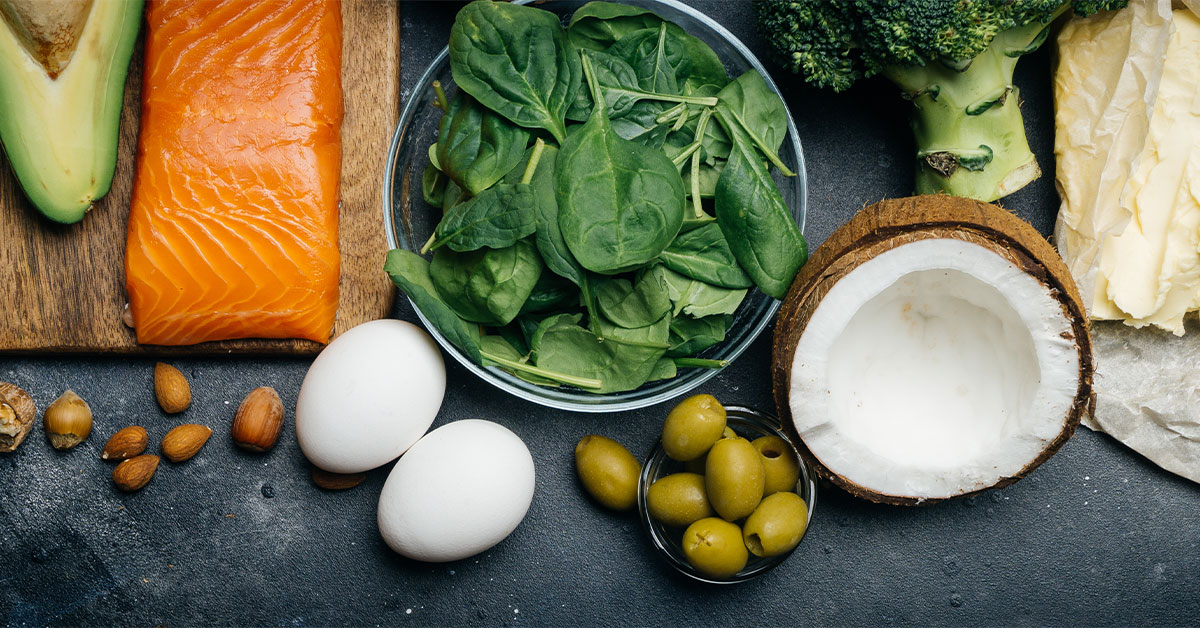





You’ve probably heard of the keto diet as a healthy way to fuel your brain, regulate weight, and increase energy levels. But, sticking to a keto diet isn’t easy. It requires fasting, limiting carbohydrates, and increasing healthy fats. Taking exogenous ketones can help get the same benefits as the keto diet without such strict eating habits. But do they work? Find out more about exogenous ketones and the science behind these supplements.
You may have heard of the ketogenic diet, usually called the keto diet—a high fat, low carb way of eating that helps your body process stored fat into energy.
The keto diet encourages a metabolic state of ketosis. During ketosis, the body breaks down fat and produces fatty acid byproducts called ketones. These ketones help send energy throughout the body.
Levels of ketones increase in the blood, measured as >0.1 mM per liter of blood. The body uses these ketones for energy when carb levels (specifically glucose and glycogen supplies) are low.
Ketones, produced during ketosis, help break down stored fat and use it as energy.
You can arrive at ketosis, and raise ketone levels, in two ways:
For most people, endogenous ketosis happens naturally in the body after following a low-carbohydrate keto diet combined with intermittent fasting. For ketosis to kick in through diet, you need to limit carbohydrates, increase healthy fats, exercise, and commit to daily intermittent fasting of at least 12 hours between eating.
When following a keto diet, carbohydrate depletion and insulin reduction cause free fatty acids (FFAs) to be released from fat stores in the body through a process called lipolysis. The FFAs travel to the liver, which uses them to produce ketone bodies. This is known as endogenous ketosis—the process when the body produces ketone bodies naturally.
The body produces three types of ketone bodies naturally:
When low on carbs, your body sends a signal for the liver to produce the AcAc ketone body. Producing AcAc helps you feel less hungry and increases energy levels. At this point, AcAc will either provide energy to cells or convert into one of two other ketone bodies.
After a long period of fasting or weeks of sticking to the keto diet, the body starts pumping out BHB. BHB has the highest energy potential out of the three types of ketone bodies.
You get acetone when BHB or AcAc breaks down. (It’s the same acetone that goes into nail polish remover). The body uses acetone when it needs immediate energy, as acetone breaks down quickly. Acetone can leave a metallic taste in the mouth, which many call “keto breath”.
Sticking to a keto diet isn’t easy. It requires a lot of discipline, especially when adjusting during the first couple of weeks. Supplementing with exogenous ketones can help during the transition period until you become healthy enough to create endogenous ketones naturally.
You could think of exogenous ketones as a shortcut to ketosis. Taking exogenous ketones can encourage ketosis, even when you don’t eat the exact macronutrient ratio and stick to fasting. They may also raise ketone levels in the body faster, to help process fats.
According to a review published in Frontiers in Physiology, exogenous ketones lower blood glucose and lipids while increasing blood ketone levels. As a result, they make it easier to achieve ketosis.
You can find a few different types of exogenous ketone supplements on the market with different advantages:
People take ketone salts to increase the level of ketones in the blood. This type of exogenous ketone usually comes as a powder or capsule mixed with electrolytes, such as calcium, magnesium, potassium, and sodium. Ketone salts are especially helpful for someone with elevated lipids with vascular concerns.
A study published in the journal Applied Physiology, Nutrition, and Metabolism found taking nutritional ketone salts helped increase fat oxidation in healthy adult males during steady exercise. However, ketone salts seemed to impair performance during high-intensity training.
Research published in Nutrients observed the effects of BHB ketone salt supplements over a 90-day period. Participants who took 3.75 grams of ketone salts experienced an increase in circulating ketones and maintained a temporary state of ketosis between 30 minutes to an hour.
Ketone esters encourage a prolonged state of ketosis. Researchers observed that ketone esters rapidly increase blood ketone levels to concentrations needed for ketosis, between 3–5 mM in healthy adults.
Ketone esters show promise in protecting the brain and nervous system, too. A study of patients with Parkinson’s disease—a progressive disorder of the nervous system—found ketone esters effective in improving endurance during exercise. Exogenous ketone esters have also shown promise in enhancing cognition and protecting the brain in animal studies.
MCT oil is a specialized form of coconut oil made from a type of fat called medium-chain triglycerides. According to a study reported in The Journal of Nutrition, MCT oils help increase blood levels of ketones.
Because it can increase cholesterol for some people, MCT makes sense for people with healthy cholesterol and without vascular concerns.
What are the best exogenous ketones? Research published in Frontiers in Physiology found that both ketone esters and ketone salts successfully increase ketone levels and achieve ketosis. They both lower blood glucose and lipids without inhibiting endogenous insulin secretion.
When starting out with exogenous ketones, whether the salt or ester, begin with a low dose. This can help your body adjust and transition gradually into ketosis.
Most people think of ketosis and the keto diet as a way to manage weight and energy levels. But, ketosis has far-reaching benefits for our overall health, especially when it comes to our brains.
In fact, leading neurologist Dr. Dale Bredesen stands behind the benefits of ketosis for protecting long-term brain health. Dr. Bredesen developed the ReCODE and PreCODE Protocols to reverse and prevent cognitive decline respectively. Both of these programs include lifestyle changes specifically for protecting brain health, which include a mildly ketogenic diet.
During the Facebook Live event, The Power of Ketosis, Dr. Bredesen explained that ketones are particularly important for cognition.
During ketosis, the body breaks down fat and turns them into ketones. These ketones help distribute energy throughout the body, and that includes the brain. This can help improve mental clarity and alertness.
Dr. Bredesen especially recommends supplementing with exogenous ketone salts or esters for those who have the APOE4 gene and/or a history of Alzheimer’s in their family until they can naturally create endogenous ketones. The brains of those with Alzheimer’s and pre-Alzheimer’s have difficulty processing glucose for energy. Ketones help “bridge that energetic gap”.
People with the APOE4 gene in particular should avoid MCT oil as they hyperabsorb dietary fat. It’s helpful to supplement with exogenous ketones as you transition to the natural process of creating endogenous ketones through a combination of diet, fasting, and exercise.
Making a major lifestyle change isn’t easy. If you do plan to go on a keto diet, follow these tips to help maintain ketosis and reap its many benefits for the brain and body:
Some who switch to a keto diet experience symptoms such as the “keto flu.” This often occurs due to dehydration. If you experience these symptoms, make sure to drink plenty of water. You can also rehydrate by increasing your intake of high-quality sea salt, which provides minerals and electrolytes. When in doubt, make sure to consult with your doctor to find out if the keto diet is right for you.
If you plan to start a keto diet, consider easing the transition by supplementing with exogenous ketones. Supplementing with either MCT, ketone salts, or ketone esters can stimulate ketosis to help burn stored fat, process energy, and protect your brain.
Keep in mind: Transitionally taking exogenous ketone supplements is part of an overall strategy for long-term brain health. Things like exercise, getting enough sleep, and managing stress also matter. You can support your brain with herbal supplements, too. Dr. Bredesen co-formulated NeuroQ Memory & Focus to boost cognitive performance with clinically-researched ingredients.
Take advantage of our hassle-free monthly auto-ship program to ensure that you never go a day without your favorite brain boosting NeuroQ formula. You can cancel your monthly auto-ship at any time.
As a member you can expect: